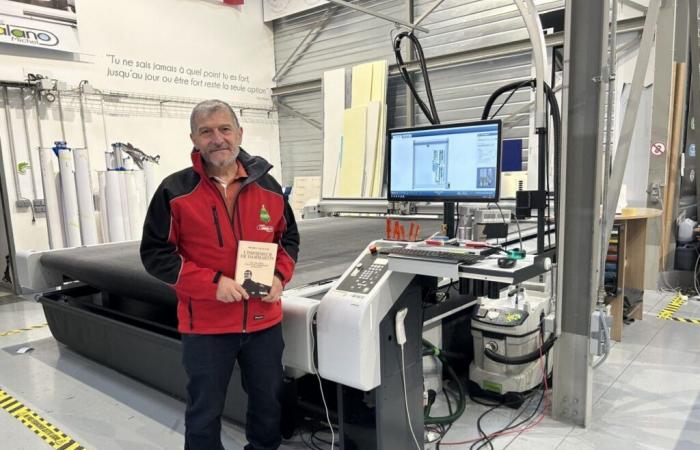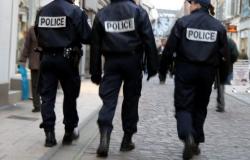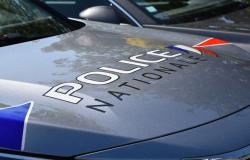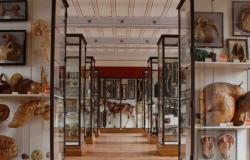Par
Baptiste Ringeval
Published on
Jan 7, 2025 at 7:00 a.m.
On January 9, 2015 at 8:30 a.m., the life of Michel Catalano rocks. The Kouachi brothers walk through the doors of their printing works in Dammartin-en-Goële. Ten years later, in a story that is both rigorous and sensitive, the sixty-year-old describes the stages of his reconstruction, parallel to that of his company in his book “ The printer of Dammartin « published on Thursday January 2. For The Marnehe looks back on these 10 years which pushed him to put everything in writing.
Why did you want to tell this story through a book?
Before it was a book, it was therapy that I did. It took me 4/5 years to write it. I wrote everything down, what I had seen, what I had experienced. At the same time, I had to understand with my psychologist why I did that, why this reaction…, I had to understand all that. Then my psychologist later asked me the question: “but who are you after all? » There, I realized that shortly after this event, my life revolved around this January 9, 2015. I felt like I was born that day, having forgotten who I was before even though I had 48 years of life behind me. It allowed me to give myself back an identity, and thanks to this book I was able to make my mark. What I wanted to do through this book was obviously to tell what had happened to me but also to take a step back to analyze it better. It's now set in stone, and I feel better for having done it, it's a relief. It allows me to better accept what happened and to finally be able to turn the page.
I designed the book as a story, but initially it was more of a very precise description. What I wanted to do afterwards was to make it readable for everyone.
In the book, you refer to moments of life, particularly with your father. Was it important for you to connect this story to your family?
I wanted to hang on to my family, to my past, to my education… When a tragedy of this type happens to you, it's not just you who are affected. That famous day, what I did, it comes from what I experienced, from the education I received. What I understood was that that day, the fact that I got through it, I owe it to myself, I freed myself on my own. And how did I achieve this? Thanks to the history I had.
In the book, you also repeat that being alone in this situation suited you, why? Likewise, you remained very calm during your hostage taking, how did you manage to manage the situation?
Actually, I had accepted the idea that I was going to die. Based on this principle, anyone who could have been there at that time would have changed the way I did things. My body went into action, I wasn't panicked at all. Another presence would have destabilized all that and my reaction would have been different, more inclined to emotion. I don't think we would have ended up the same way.
I asked myself, how could I stay so calm and manage so well? Finally, it is thanks to my experience. In my life, I had to deal with things that were not easy and I realized that it was part of my life. I'm a business owner, dealing with issues all day. I was a hockey player-coach, I'm a father, so I also had that experience. All of this combined, and even if this is not a usual situation, it allowed me to get out of it and confront my two captors as best I could. And this is also what I wanted to testify to in my book. In life, we experience things but we don't realize that they could be useful to us later. But I needed to understand all of this.
During your hostage taking, you ask your captors if you can leave, did you really think they would accept?
The first time I asked the question, I didn't believe it. I'm pretty sure they're going to say no because they want me to act as a human shield against the snipers setting up all over the building. The second time, when I asked the question again after treating one of the two Kouachi brothers, I saw that his brother was hesitant. And the third time, seeing this hesitation, I asked the question a little more directly and he told me I could go. He seemed to have appreciated that I looked after his brother, that must have weighed in the balance. The other was more in the action. He had determined that he was going to die that day, and had that in mind.
You also managed to hide Lilian's presence from the terrorists. Did it reassure you to know he was safer?
What kept me going that day wasn't me, I knew I was going to die. It is rather the act of acting so that Lilian, my collaborator hidden in the premises, can come out alive. Actually, I was all alone but in my head, I was focused on him. I thought about him all the time. I had drawn an imaginary line for myself not to cross because I knew roughly what zone he was in. I often say that he saved my life, he kept me going.
The worst part of this story is that everything could have turned out quite differently. In fact, and I learned this much later, when the Kouachi brothers arrived in the parking lot of the printing house, they asked my workshop manager who was also arriving, how many people there were in the premises. . And the latter replied that I was alone despite Lilian's car. He could have told them there were two of us, but no. And so once inside, when they asked me if I was alone and I answered in the affirmative, it made sense with the words of my workshop leader. In the end, it doesn't matter much.
Your wife, Véronique, was particularly touched by January 9, was it difficult to see her in this state?
Yes. That day, I was often told that I was lucky, that I was one of the only ones who was still alive after being in contact with terrorists. For me it wasn't luck, but like I said, I got through it because of my experience. Subsequently, the luck I had was to be able to count on my family and in particular my wife. But it’s true that she also dived from time to time. She lives with me night and day and she has taken it again and again. Except that she wasn't asked if she was okay. So she took hits without necessarily being able to talk about it and it touched me deeply. Ultimately, I needed her and those around me to be well, so that I could get through it.
I also understood, particularly by talking with other victims, that at some point, you have to be selfish to get back on track. Because if I had gone down, my wife would have gone down with me. So I had to get out of it. And despite a recent difficult period, she is still doing much better. And just like me, publishing the book finally allows us to better accept this complicated stage.
Why did you have this desire to rebuild in the same place? Do you have flashes at times?
It was important for me to rebuild in the same place because I absolutely wanted bring life back into this building, that the image is beautiful, that people forget. Me, I can't forget and it's not by going elsewhere that that would have been the case, on the contrary. This reconstruction allowed me to accept it and to have this story with me because it is an integral part of my life. A choice that was not that of my family, who wanted to leave. And I admit that I forced them a little but I don't regret it and they don't have any more. It wasn't the easiest path, but it was necessary. I didn't want to be forced to leave either, I had nothing to reproach myself for.
Yes, sometimes when I open my electric gate in the morning, I have an emotion that comes up. We're at the time of year when it happened, and I thought after 10 years that it would pass, but ultimately, it's a period, between the end of the year and the beginning of the year next, where I am always a little more fragile, where emotions always come up more and more.
Do you still have contact with Lilian today?
I have them very regularly. Ultimately, what binds us to Lilian is stronger than what people imagine. We experienced the horror together, we thought we were both going to die. We experienced something that is so strong that we have an unbreakable bond. He is part of my life.
What did January 9, 2015 change in your everyday life?
I am no longer the same man at all. I like aviation, I like cars, I was a paramotor pilot, I skydived. I put all that aside, I no longer want it. I also have phobias that I didn't have before. I can't have an MRI anymore, I can't stand lying in the dark, I still have trouble sleeping… I've also become super vigilant. For example, I can't help but constantly look at the surveillance screens, or when I go to a restaurant, I sit at a table where I am sure I can check everything that is happening around me . I'm always on the alert, it's become almost instinctive.
How is your printing business doing today?
It was very hard for 10 years. We experienced 5 years of deficit and just as we were starting to recover, the Covid period made us plunge again. But this year, for the first time, we find a turnover equivalent to that before 2015. I'm waiting for confirmation, but it would be a good sign to say that after 10 years, we would be able to get by. In my opinion, my business is like my third child and the fact that she is moving forward also allows me to move on.
Follow all the news from your favorite cities and media by subscribing to Mon Actu.






